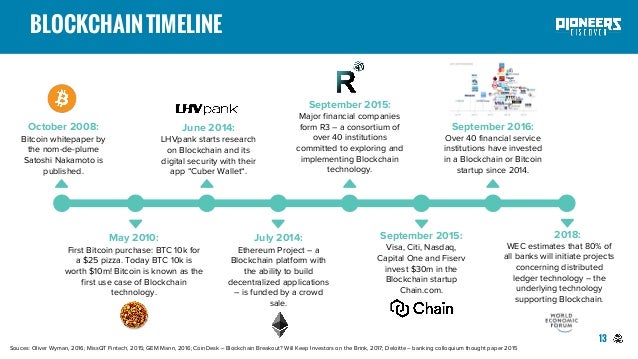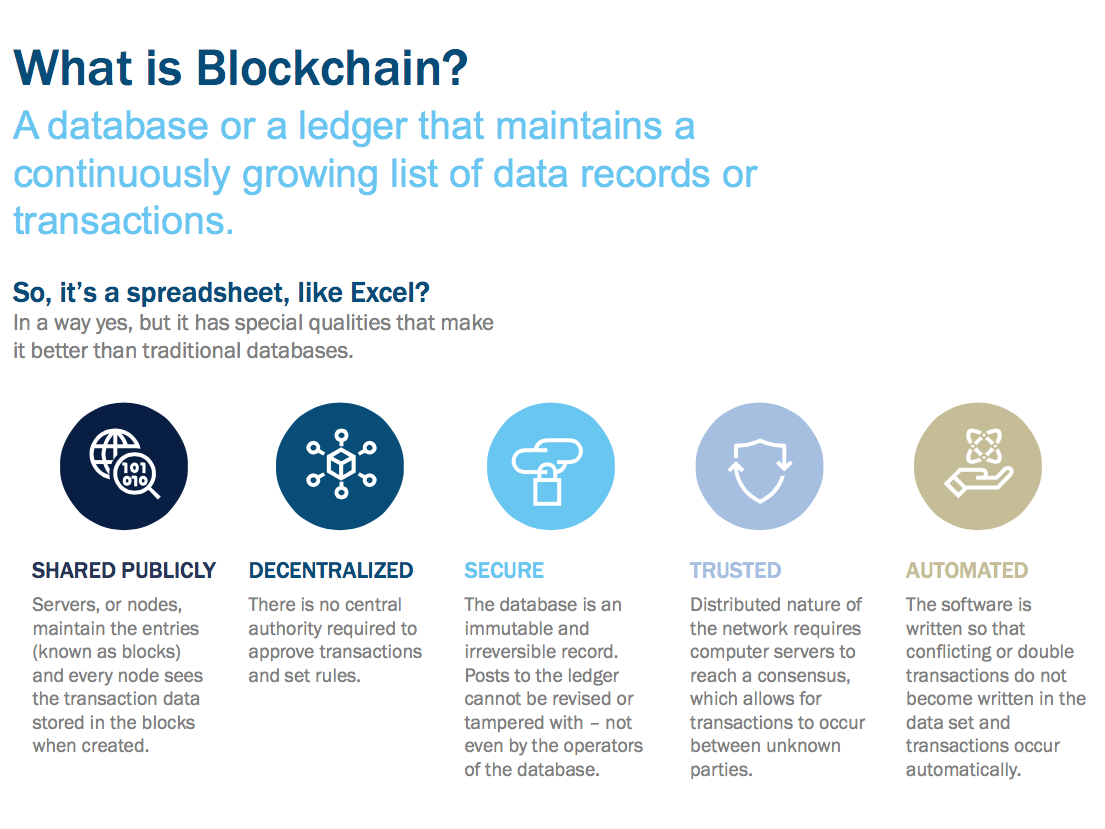
My blog gives all data, facts and statistics about global real politic economic system, factors of production, poverty and inequality. Also I give information about popular hedonic life of human-beings. I believe that economy science must become a holistic social science that includes all multi dimensions of human (body, mind, soul) and to give inspiration (motivation) to become perfect "homo-economicus" generations for the 21th century.
blockchain etiketine sahip kayıtlar gösteriliyor. Tüm kayıtları göster
blockchain etiketine sahip kayıtlar gösteriliyor. Tüm kayıtları göster
2/28/2018
2/27/2018
blockchain timeline...
 |
| Blockchain technology has the potential to reduce costs, improve product offerings and increase speed for banks, according to the most recent report from the Euro Banking Association (EBA). |
When blockchain technology meets IoT...
When the Blockchain Technology meets the Internet of Things
In this ever-growing world of technology, we are staring to hear how the Internet of Things (IoT) is bound to change our homes, our offices and our cities. There are numerous reports about this incredible new trend. Most of these reports, include the current state of IoT and also interesting forecasts for the future impact on the world’s economy and society. It looks promising to say the least.

The Blockchain Technology...
The Blockchain technology – previously used in digital currencies such as Bitcoin – has certainly caused a storm in the world of finance and banking (or, more simply, FinTech). Innovative start-ups are already applying this technology to cut down the cost of transferring money. Big investment funds, alongside major banking giants, are investing hundreds of millions in such breakthrough projects. The perfect example of how this is changing the banking industry is the announcement that 22 major banks are joining a consortium to form a common framework for using blockchain technology (the R3 blockchain consortium).
https://www.rs-online.com/designspark/when-the-blockchain-technology-meets-the-internet-of-things

https://www.rs-online.com/designspark/when-the-blockchain-technology-meets-the-internet-of-things

2/23/2018
Blockchain and the Law
Since Bitcoin appeared in 2009, the digital currency has been hailed as an Internet marvel and decried as the preferred transaction vehicle for all manner of criminals. It has left nearly everyone without a computer science degree confused: Just how do you “mine” money from ones and zeros?
The answer lies in a technology called blockchain, which can be used for much more than Bitcoin. A general-purpose tool for creating secure, decentralized, peer-to-peer applications, blockchain technology has been compared to the Internet itself in both form and impact. Some have said this tool may change society as we know it. Blockchains are being used to create autonomous computer programs known as “smart contracts,” to expedite payments, to create financial instruments, to organize the exchange of data and information, and to facilitate interactions between humans and machines. The technology could affect governance itself, by supporting new organizational structures that promote more democratic and participatory decision making.
Primavera De Filippi and Aaron Wright acknowledge this potential and urge the law to catch up. That is because disintermediation—a blockchain’s greatest asset—subverts critical regulation. By cutting out middlemen, such as large online operators and multinational corporations, blockchains run the risk of undermining the capacity of governmental authorities to supervise activities in banking, commerce, law, and other vital areas. De Filippi and Wright welcome the new possibilities inherent in blockchains. But as Blockchain and the Law makes clear, the technology cannot be harnessed productively without new rules and new approaches to legal thinking.
2/22/2018
Blockchains and Bitcoin
The blockchain is perhaps the main technological innovation of Bitcoin. Bitcoin isn’t regulated by a central authority. Instead, its users dictate and validate transactions when one person pays another for goods or services, eliminating the need for a third party to process or store payments. The completed transaction is publicly recorded into blocks and eventually into the blockchain, where it’s verified and relayed by other Bitcoin users. On average, a new block is appended to the blockchain every 10 minutes, through mining.
Based on the Bitcoin protocol, the blockchain database is shared by all nodes participating in a system. Upon joining the network, each connected computer receives a copy of the blockchain, which has records, and stands as proof of, every transaction ever executed. It can thus provide insight about facts like how much value belonged a particular address at any point in the past. Blockchain.info provides access to the entire Bitcoin blockchain.
Read more: Blockchain Definition | Investopedia https://www.investopedia.com/terms/b/blockchain.asp#ixzz57fQWjyyW
Follow us: Investopedia on Facebook
Bitcoin and Blockchain: The Potential for Remittances and Supply Chain Management
Indian families living abroad may be able to benefit from Bitcoin, cryptocurrencies, and other blockchain innovations. Prof. Raul Dé at the Indian Institute of Management Bangalore says the technology may make remittance payments faster, cheaper, and more transparent. However, some regulation and streamlining is needed to ensure the technology reaches its peak safety and efficiency.
- Rahul Dé Hewlett-Packard Chair Professor, Indian Institute of Management Bangalore
FEBRUARY 09, 2018
Can Blockchain Become the Infrastructure of Financial Services?
Blockchain software is best known for its role in creating bitcoin, but the distributed ledger technology could have an much larger impact as a secure, nearly frictionless replacement for the slow, expensive, arcane financial services infrastructure. Digital Asset’s CEO Blythe Masters sees a chance for that in the near future.
BLYTHE MASTERS
BLYTHE MASTERS
2/21/2018
BLOCKCHAIN...
The blockchain is an undeniably ingenious invention – the brainchild of a person or group of people known by the pseudonym, Satoshi Nakamoto. But since then, it has evolved into something greater, and the main question every single person is asking is: What is Blockchain?
By allowing digital information to be distributed but not copied, blockchain technology created the backbone of a new type of internet. Originally devised for the digital currency, Bitcoin, (Buy Bitcoin) the tech community is now finding other potential uses for the technology.
Bitcoin has been called “digital gold,” and for a good reason. To date, the total value of the currency is close to $9 billion US. And blockchains can make other types of digital value. Like the internet (or your car), you don’t need to know how the blockchain works to use.
Blockchain...
A blockchain is a digitized, decentralized, public ledger of all crypto currency transactions. Blockchain has been popularized by Bitcoin and is very disruptive to all centralized corporate structures.
Kaydol:
Yorumlar (Atom)
Why the heck is there still an automotive chip shortage?
A side from the raw, human toll, COVID-19 has dramatically changed how we live, from travel and education to the way people work. This ...
-
The beauty of science may be pure and eternal, but the practice of science costs money. And scientists, being human, respond to incentives ...
-
Roubini is one of few economists who predicted the housing bubble crash of 2007-2008. He warned about the crisis in an IMF position paper in...
-
Blockchain technology has the potential to reduce costs, improve product offerings and increase speed for banks, according to the most rec...


